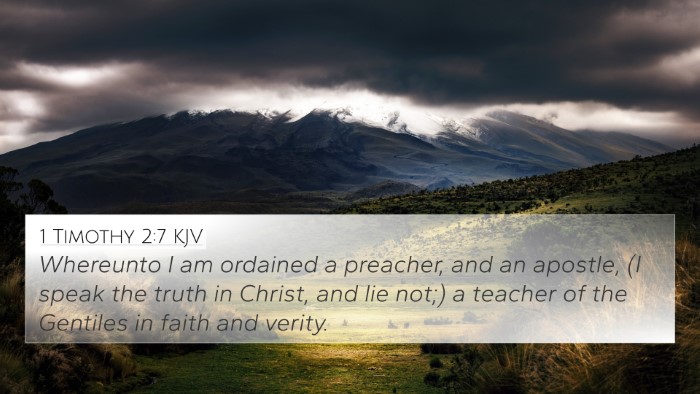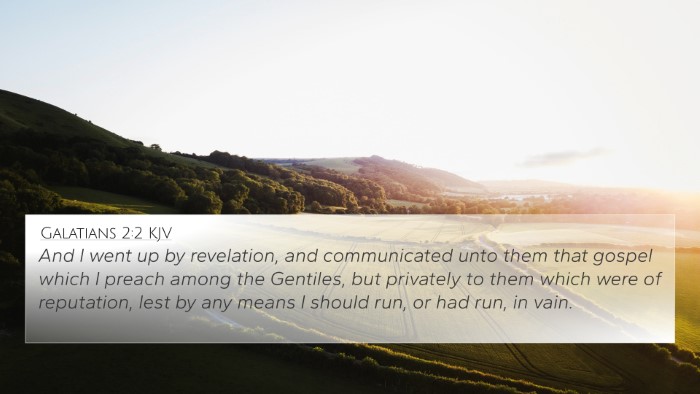Understanding Romans 11:13
Verse: "For I speak to you Gentiles; inasmuch as I am the apostle of the Gentiles, I magnify mine office."
In this verse, the Apostle Paul addresses the Gentile believers directly, affirming his role as their appointed apostle. He emphasizes the importance of his mission and seeks to elevate the understanding of his apostolic ministry in relation to the salvation of the Gentiles.
Meaning and Interpretation
The complexities of Romans 11:13 revolve around Paul’s identity and mission. Commentators like Matthew Henry, Albert Barnes, and Adam Clarke bring forth several insights:
- Paul's Apostolic Authority: Paul identifies himself firmly as the apostle to the Gentiles. His role is crucial in bridging the gap between Jewish and Gentile believers, signifying the inclusivity of the Gospel.
- Purpose of Exaltation: By stating he "magnifies" his office, Paul expresses his intent to show the glory and significance of his ministry, which ultimately aims to draw Gentiles towards Christ.
- Cultural Context: In the era when Paul wrote, there was significant tension between Jewish and Gentile Christians. His assertion seeks to validate Gentile inclusion in God’s plan of salvation.
- Theological Implication: The verse underscores the belief that God’s grace is available to all, not just a select group, aligning with the overarching themes of the Pauline epistles regarding faith and righteousness through Christ.
- Magnifying the Gospel: This passage compels believers to appreciate the Gospel’s expansive reach and to recognize the vital role of cross-cultural missions in the New Testament.
Cross-References and Connections
Romans 11:13 connects with several other scripture passages, enhancing its understanding. Key verses include:
- Acts 9:15: God declares Paul as a chosen vessel to bear His name before the Gentiles.
- Galatians 2:8: Paul is acknowledged for his ministry to the Gentiles, highlighting the divine commissioning he received.
- Romans 1:16: The Gospel is for everyone—first for the Jew, then for the Gentile, confirming the universal outreach of salvation.
- Ephesians 3:6: States that the Gentiles are fellow heirs and partakers of God’s promise in Christ through the Gospel.
- Colossians 1:27: Christ in you, the hope of glory, speaks to the transformative power of faith accessible to all believers.
- Matthew 28:19: The Great Commission commands disciples to make followers of all nations, signifying the initiation of Gentile outreach.
- 1 Timothy 2:4: God desires all people to be saved, reinforcing the inclusive nature of His salvific plan.
Thematic Connections
This verse serves as a pivotal point for those studying the interrelationships within Biblical texts. Whether looking into Pauline theology or the shift from Old Testament exclusivity to New Testament inclusion, Romans 11:13 exemplifies significant themes:
- Inclusivity in Salvation: The call to Gentiles marks a theological shift, showcasing God’s universal plan.
- Covenantal Understanding: Examining how the New Covenant pertains to both Jews and Gentiles is crucial for biblical interpretation.
- Mission Theology: Romans 11:13 reflects the necessity of outreach beyond cultural boundaries—an essential tenet of the Christian faith.
Tools for Bible Cross-Referencing
Using tools for Bible cross-referencing can enrich your study of this verse:
- Bible Concordance: Helps in identifying connections and the usage of specific words across scripture.
- Bible Reference Resources: Guides to explore themes and find parallel verses for deeper insights.
- Cross-Reference Bible Study Materials: Collections of scripture that are thematically linked, aiding in comparative analysis.
Conclusion
Romans 11:13 serves as a beacon for understanding the Apostle Paul's role in God's salvific plan for the Gentiles, highlighting themes of inclusion, mission, and grace. By employing cross-referencing methods and recognizing linkages between verses, believers can deepen their scriptural understanding and enhance their faith journey.













